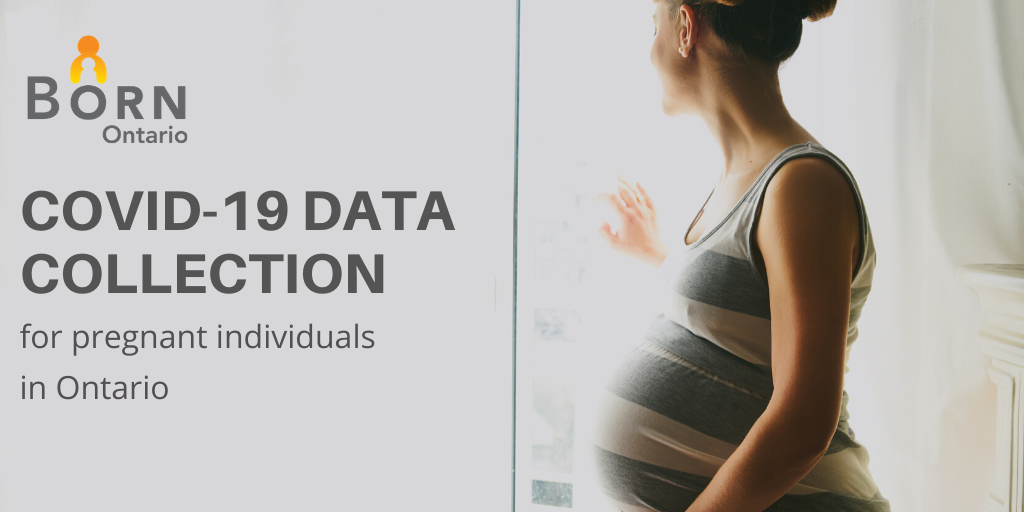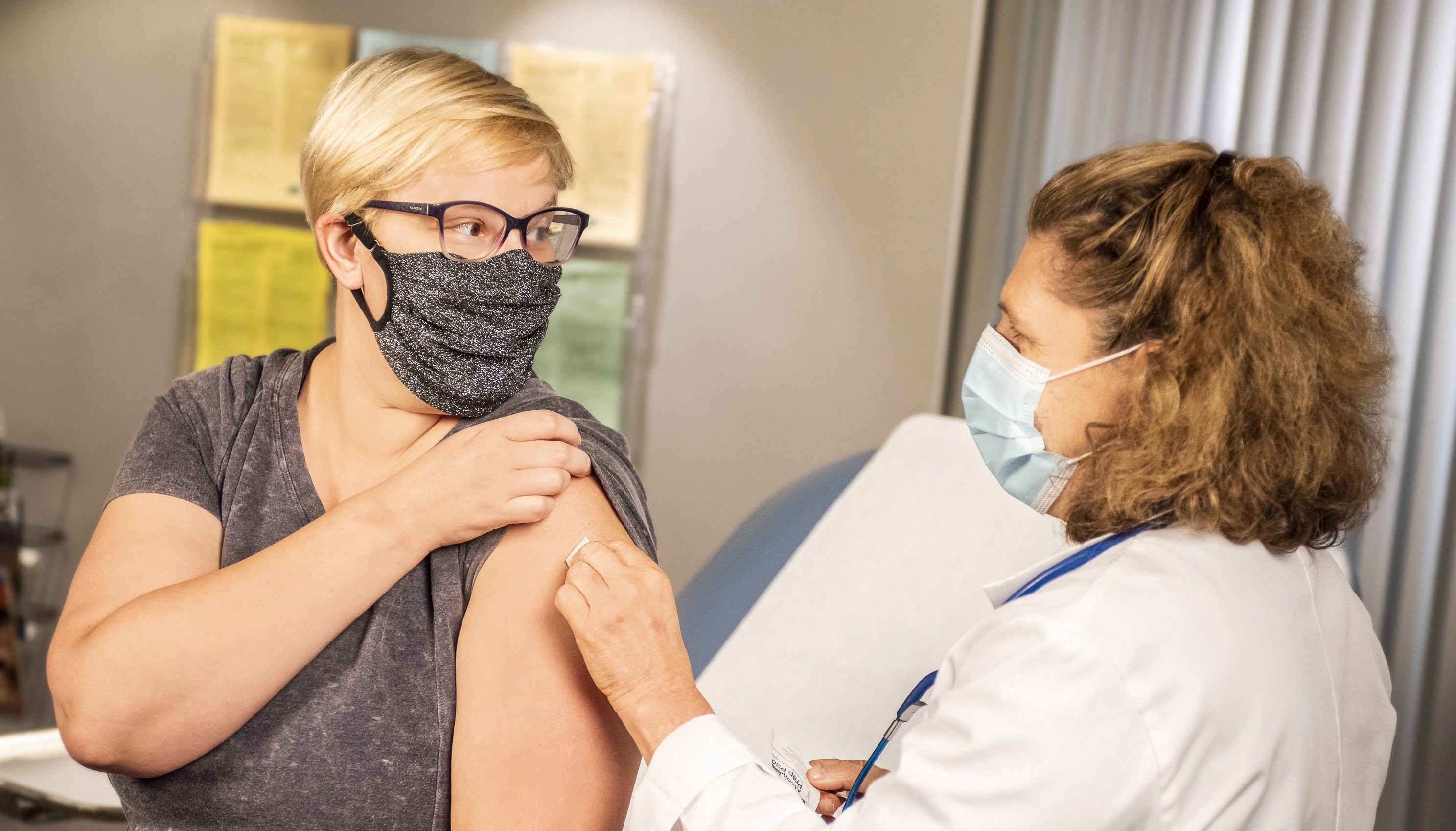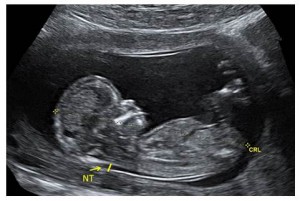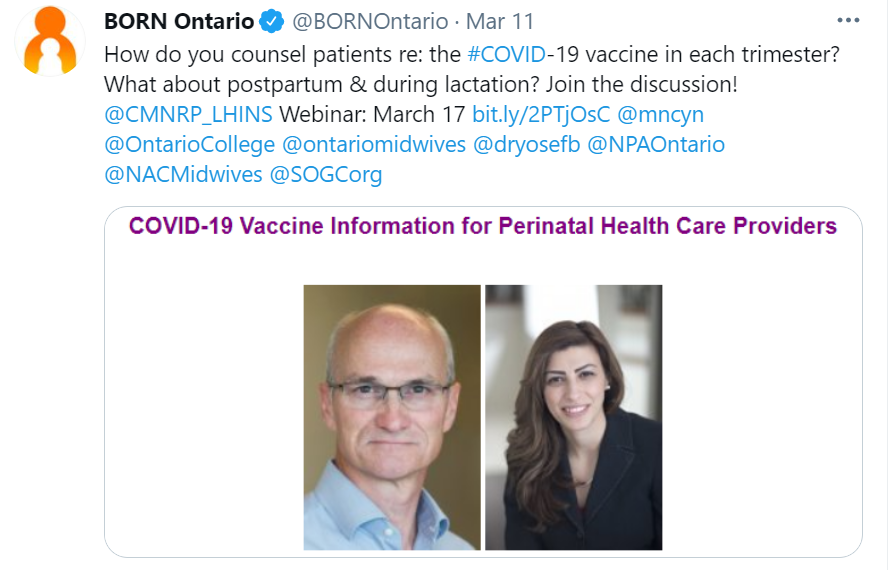COVID-19 During Pregnancy
BORN Contributions to the Fight Against COVID-19
| Surveillance | ||||||
|
||||||
| Research | ||||||
|
||||||
| Screening Service Adjustments | ||||||
|
Since the first wave of the pandemic, Prenatal Screening Ontario (PSO) worked with the Ministry of Health (MOH) to ensure that high-quality prenatal screening services remain available to pregnant individuals. An adjusted screening algorithm was implemented in April 2020 and will remain in effect until March 31, 2022. PSO continuously monitors screening uptake under the temporary algorithm, providing feedback to the MOH on a regular basis. |
||||||
| Guidance | ||||||
|
||||||
| Updates for the Public | ||||||
|
Pregnant During the Pandemic
 Dominique Denver, who is expecting her first child in the summer of 2021, says she was initially “quite torn” about getting the COVID-19 vaccine: “The vaccine had never been trialed with pregnant people. Yes, there were some reports that a few women in clinical trials had discovered later that they had been pregnant at the time of their immunization, but that was about it.”
Dominique Denver, who is expecting her first child in the summer of 2021, says she was initially “quite torn” about getting the COVID-19 vaccine: “The vaccine had never been trialed with pregnant people. Yes, there were some reports that a few women in clinical trials had discovered later that they had been pregnant at the time of their immunization, but that was about it.”
| Read more of Dominique's Story |
|
Different recommendations from professional bodies also made her pause: “I was conflicted because the Society of Obstetricians and Gynecologists of Canada (SOGC) initially did NOT recommend that pregnant Canadians get vaccinated. In contrast, the ACOG American College of Obstetricians and Gynecologists (ACOG) and RCOG Royal College of Obstetricians and Gynecologists (RCOG) - the British equivalent, DID recommend that pregnant Americans and Brits get vaccinated.” She discussed the issue with her obstetrician, but was still undecided: “My OB could only advise that I try to reduce my exposure as best I could, and that ultimately, the decision was mine.” When the SOGC changed its official position statement and began advocating for Canadians to get the COVID vaccine, Dominique was encouraged: “Now there were 3 reputable bodies advocating for immunization in pregnancy...4 if you count the World Health Organization”. The information that tilted the scales in favor of vaccination for Dominique was learning that babies born to women who had been immunized while pregnant, had developed antibodies against COVID-19: “That was wonderful news! The infants had a measure of protection against the virus because of mom's immunization while pregnant. That was the deciding factor for me. I wanted to give my child every advantage in facing this pandemic.” She planned to get vaccinated at 34 weeks. However, the third wave heralded the arrival of the more contagious virus variants and hospitals were seeing more younger adults admitted with Covid-19. Given this new development, Dominique decided to get the vaccine sooner: she was vaccinated at 30 weeks and 5 days pregnant. When asked about advice for others struggling, she says, “It’s a very personal decision. As in all decisions, it comes down to weighing the pros and cons and deciding where the balance tips. Yes, the COVID-19 vaccines are new. However, the fundamental science of immunology and how these vaccines work to procure immunity is not.” |
Data Analysis - A Peek Behind the Scene
 Dr. Gillian Alton is about as close to COVID-19 data as you can get. Her current work involves importing and validating the data BORN receives from three sources:
Dr. Gillian Alton is about as close to COVID-19 data as you can get. Her current work involves importing and validating the data BORN receives from three sources:
1. Case Report Forms (submitted by hospitals, midwifery practice groups, and other organizations),
2. The Public Health Case and Contact Management Solution (CCM), and
3. COVaxON (the provincial system to record COVID vaccination and adverse events).
| Read more of Dr. Alton's Story... |
| Dr. Alton links and matches the incoming data with data from the BORN Information System. This sounds deceptively simple, but is complex, rigorous work that is very time consuming. Next comes the data analysis and summarization – another intense process. As you can imagine the demand for this data is high and Dr. Alton receives requests to present this information to all kinds of stakeholder groups. She also prepares data summaries for CANCOVID-Preg national surveillance.
When asked why we need Ontario-specific data, Dr. Alton points to spatio-temporal variation: “The burden of illness hasn’t been the same in all provinces at the same time. We have seen regional differences in the prevalence of disease in the general population, as well as, pregnant individuals. We have also seen regional differences in public health policies across Canadian provinces. In order to provide valuable data for evidence-informed policy and decision-making, we require Ontario-specific data. The key to success in population-level surveillance are large amounts of data. As such, it is important to collect high-quality data in Ontario.” Dr. Alton acknowledges that keeping up with the changing science, policies and research is challenging - as is dealing with the uncertainty of how long the pandemic will last. But she knows this work is vital and finds it personally and professionally rewarding to contribute to improved health outcomes for mothers and babies in Ontario. She is also quick to point out the hard work and dedication of the clinicians and administrators in hospitals and midwifery practice groups who are submitting the data: “COVID in pregnancy surveillance would not exist without the hard work and dedication of our hospital and midwifery practice group stakeholders. We have 91 organizations across Ontario completing case report forms and all hospitals and MPGs contributing pregnancy and birth data to the BIS. Our healthcare system has been stressed to the max with COVID, but our stakeholders did not let that stop them from contributing valuable data around COVID in pregnancy. To date, we have received 750 completed case report forms. In addition, we are able to link our case report forms and public health COVID testing data because of the efficient data entry/upload of labour and birth information from stakeholders.” Dr. Alton calls COVID-in-pregnancy surveillance “a massive team effort” and says she’s been amazed to see so much collaboration and teamwork to improve maternal and child health outcomes in Ontario. |




 As a comprehensive source of population-level perinatal health information in Ontario, BORN is uniquely positioned to collect data and facilitate the understanding of how COVID-19 infection and vaccination impacts pregnant individuals and their newborns.
As a comprehensive source of population-level perinatal health information in Ontario, BORN is uniquely positioned to collect data and facilitate the understanding of how COVID-19 infection and vaccination impacts pregnant individuals and their newborns.  CANCOVID-Preg is a national surveillance project developed to better understand the epidemiology and outcomes associated with COVID-19 in pregnancy and provide critical data to inform recommendations for pregnant women and their infants.
CANCOVID-Preg is a national surveillance project developed to better understand the epidemiology and outcomes associated with COVID-19 in pregnancy and provide critical data to inform recommendations for pregnant women and their infants.  In an effort to protect pregnant individuals, families and health care workers during the pandemic, new policies and practices were implemented in the maternal-newborn health care arena. To understand the impact of these practice changes, BORN (in conjunction with the BORN Maternal Newborn Outcomes Committee) has initiated a study to examine system-level outcomes associated with the pandemic.
In an effort to protect pregnant individuals, families and health care workers during the pandemic, new policies and practices were implemented in the maternal-newborn health care arena. To understand the impact of these practice changes, BORN (in conjunction with the BORN Maternal Newborn Outcomes Committee) has initiated a study to examine system-level outcomes associated with the pandemic. Pregnant individuals are considered a high-risk population for COVID-19 complications, based on higher rates of COVID-19 hospitalization and ICU admission, compared with similar aged non-pregnant people. Many have already received a COVID-19 vaccine in pregnancy to guard against these risks, but more data are needed to evaluate vaccine safety and effectiveness across the population.
Pregnant individuals are considered a high-risk population for COVID-19 complications, based on higher rates of COVID-19 hospitalization and ICU admission, compared with similar aged non-pregnant people. Many have already received a COVID-19 vaccine in pregnancy to guard against these risks, but more data are needed to evaluate vaccine safety and effectiveness across the population. Ontario normally has a two-step
Ontario normally has a two-step  BORN is providing de-identified provincial data and epidemiological expertise to help understand the Canadian COVID-19 prevalence rates in pregnancy and the associated outcomes for pregnant individuals and their newborns.
BORN is providing de-identified provincial data and epidemiological expertise to help understand the Canadian COVID-19 prevalence rates in pregnancy and the associated outcomes for pregnant individuals and their newborns. Drawing on lessons learnt from influenza vaccination studies, Dr. Deshayne Fell (BORN affiliate) and colleagues recently published
Drawing on lessons learnt from influenza vaccination studies, Dr. Deshayne Fell (BORN affiliate) and colleagues recently published 
 The OMama website and app connect users to evidence-informed pregnancy, birth and early parenting information, including
The OMama website and app connect users to evidence-informed pregnancy, birth and early parenting information, including BORN and Prenatal Screening Ontario use social media platforms such as Twitter and Facebook to share information and amplify messages from provincial and national partners about COVID-19 recommendations for pregnant individuals.
BORN and Prenatal Screening Ontario use social media platforms such as Twitter and Facebook to share information and amplify messages from provincial and national partners about COVID-19 recommendations for pregnant individuals. Subscribe to this page
Subscribe to this page
